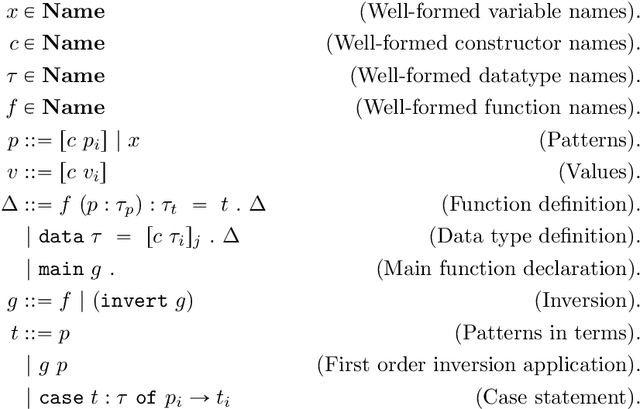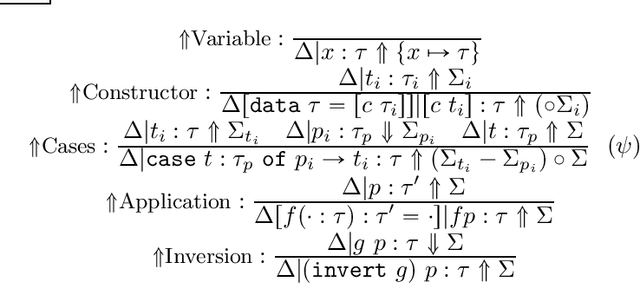Joachim Tilsted Kristensen
Tail recursion transformation for invertible functions
Feb 20, 2023Abstract:Tail recursive functions allow for a wider range of optimisations than general recursive functions. For this reason, much research has gone into the transformation and optimisation of this family of functions, in particular those written in continuation passing style (CPS). Though the CPS transformation, capable of transforming any recursive function to an equivalent tail recursive one, is deeply problematic in the context of reversible programming (as it relies on troublesome features such as higher-order functions), we argue that relaxing (local) reversibility to (global) invertibility drastically improves the situation. On this basis, we present an algorithm for tail recursion conversion specifically for invertible functions. The key insight is that functions introduced by program transformations that preserve invertibility, need only be invertible in the context in which the functions subject of transformation calls them. We show how a bespoke data type, corresponding to such a context, can be used to transform invertible recursive functions into a pair of tail recursive function acting on this context, in a way where calls are highlighted, and from which a tail recursive inverse can be straightforwardly extracted.
Jeopardy: An Invertible Functional Programming Language
Sep 06, 2022


Abstract:An algorithm describes a sequence of steps that transform a problem into its solution. Furthermore, when the inverted sequence is well-defined, we say that the algorithm is invertible. While invertible algorithms can be described in general-purpose languages, no guarantees are generally made by such languages as regards invertibility, so ensuring invertibility requires additional (and often non-trivial) proof. On the other hand, while reversible programming languages guarantee that their programs are invertible by restricting the permissible operations to those which are locally invertible, writing programs in the reversible style can be cumbersome, and may differ significantly from conventional implementations even when the implemented algorithm is, in fact, invertible. In this paper we introduce Jeopardy, a functional programming language that guarantees program invertibility without imposing local reversibility. In particular, Jeopardy allows the limited use of uninvertible -- and even nondeterministic! -- operations, provided that they are used in a way that can be statically determined to be invertible. However, guaranteeing invertibility is not obvious. Thus, we furthermore outline three approaches that can give a partial static guarantee.
 Add to Chrome
Add to Chrome Add to Firefox
Add to Firefox Add to Edge
Add to Edge